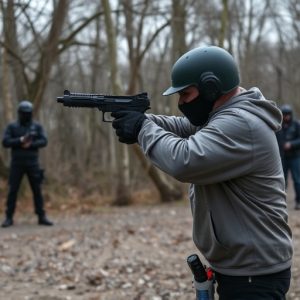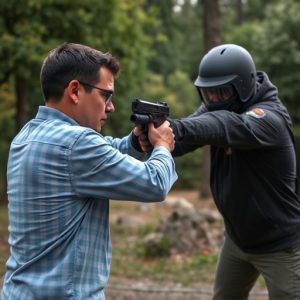Civilian Taser Laws: A State-by-State Guide to Stun Gun Ownership
The stun gun vs shock baton comparison reveals stark differences in legal requirements and regulatio…….
The stun gun vs shock baton comparison reveals stark differences in legal requirements and regulation due to distinct design and functionality. In the U.S., state laws governing civilian ownership vary widely, with some states allowing unrestricted access while others mandate training, background checks, and licensing. Stun guns, utilizing electrical current for incapacitation (ECDs), face stricter regulations compared to shock batons which combine mechanical force with low-voltage shocks. Understanding these differences is crucial for compliance, safe usage, and responsible ownership of personal defense devices. This comparison highlights the unique legal landscapes and user responsibilities surrounding stun guns and shock batons.
“Unveiling the Complexities of Civilian Taser Ownership: A Comprehensive Guide. In today’s world, self-defense options are more diverse than ever, with stun guns and shock batons at the forefront. This article offers a meticulous Stun Gun vs. Shock Baton comparison, delving into their differences and similarities. We explore the legal landscape of civilian ownership, state-by-state regulations, eligibility criteria, licensing requirements, and safety precautions. By understanding these factors, citizens can navigate the legal complexities and make informed decisions regarding self-defense.”
- Understanding Stun Guns and Shock Batons: A Comprehensive Comparison
- Legal Landscape: State-by-State Civilian Ownership Rules for Tasers
- Who Can Own a Stun Gun? Eligibility Criteria Across the US
- Licensing and Permits: Unraveling the Requirements for Responsible Ownership
- Restrictions and Prohibitions: States with Strict Stun Gun Laws
- A Citizen's Guide to Legal Defense and Safety Precautions
Understanding Stun Guns and Shock Batons: A Comprehensive Comparison
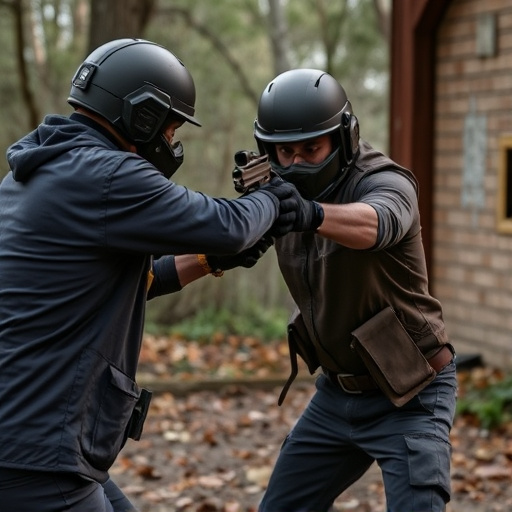
Stun guns and shock batons, often used interchangeably, are two distinct devices designed to incapacitate an individual through electric shocks. The primary difference lies in their form factor and intended use. Stun guns typically resemble firearms, with a barrel and a trigger mechanism, while shock batons are more like large flashlights or batons with protruding electrodes. In terms of functionality, both devices deliver electrical current through the skin to disrupt muscle control, causing temporary immobilization.
When considering stun gun vs shock baton comparison, it’s crucial to understand their legal status and use cases. Stun guns are generally governed by more stringent regulations due to their resemblance to firearms. Owning a stun gun might require permits or registration, depending on state laws. In contrast, shock batons often fall under less restrictive categories and may be readily available for purchase without extensive background checks. This comparison highlights the practical differences that potential owners should consider based on their specific needs and local regulations.
Legal Landscape: State-by-State Civilian Ownership Rules for Tasers

In the United States, the legal landscape surrounding civilian taser ownership varies significantly from state to state. This creates a complex web of regulations that potential buyers must navigate before acquiring one of these powerful non-lethal weapons. At its core, the discussion revolves around balancing personal safety and public safety, with each state striking its own balance through unique legislation.
Some states, like Texas, allow anyone over 18 to purchase a taser without significant restrictions, presenting a relatively permissive environment for civilian ownership. Conversely, other states, such as New York, impose stringent requirements, including mandatory training and background checks, reflecting more cautious approaches to arming the general public with stun guns or shock batons (a comparison often used to highlight their functionality). This state-by-state variation underscores the diverse perspectives on personal defense and law enforcement across America.
Who Can Own a Stun Gun? Eligibility Criteria Across the US
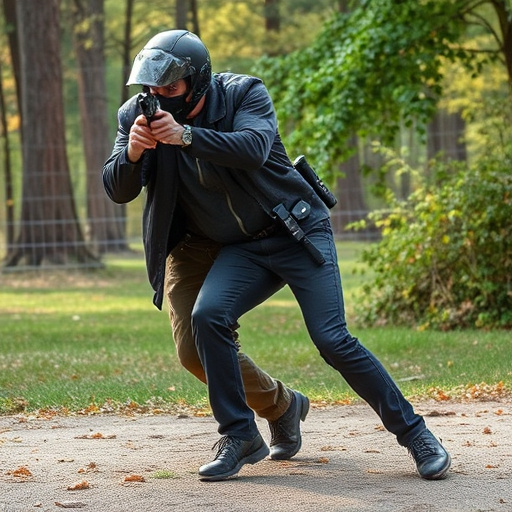
In the United States, the eligibility criteria for owning a stun gun or shock baton vary significantly from state to state. Generally, individuals who meet certain legal age requirements and pass background checks are allowed to purchase and possess these devices. Some states have strict restrictions on who can own a stun gun, while others offer broader access.
The comparison between a stun gun and a shock baton is an important factor in determining eligibility. Stun guns are typically defined as electronic control devices (ECDs) that use electrical current to incapacitate a target, whereas shock batons employ mechanical force combined with low-voltage electric shocks. This distinction influences state regulations, with some laws specifically addressing the ownership of ECDs and others focusing on shock batons or both. It’s crucial for prospective owners to understand these legal nuances to ensure compliance with their state’s requirements.
Licensing and Permits: Unraveling the Requirements for Responsible Ownership
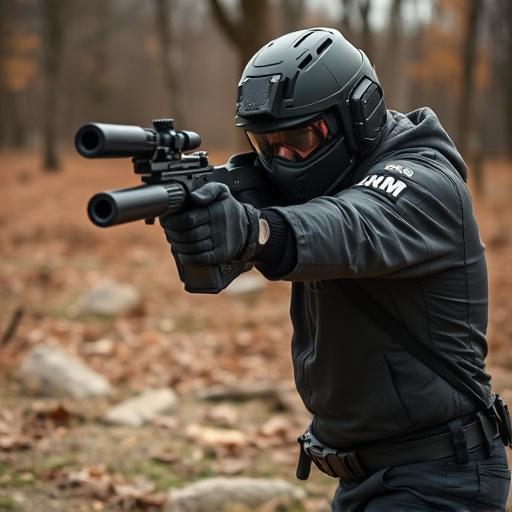
In many states, civilian ownership of a stun gun or shock baton involves more than just purchasing the device. Licensing and permits are often required to ensure responsible ownership and use. This regulatory framework aims to maintain public safety while allowing individuals to protect themselves. The process typically includes background checks, training courses, and, in some cases, written examinations.
Understanding the specific requirements varies by state. A stun gun vs shock baton comparison reveals distinct features and uses, with each type having its own set of regulations. For instance, some states might differentiate between low-voltage personal protection devices and higher-powered models used for law enforcement. Licensing and permits ensure that owners are knowledgeable about their device’s capabilities and limitations, promoting safe and legal usage in unexpected situations.
Restrictions and Prohibitions: States with Strict Stun Gun Laws
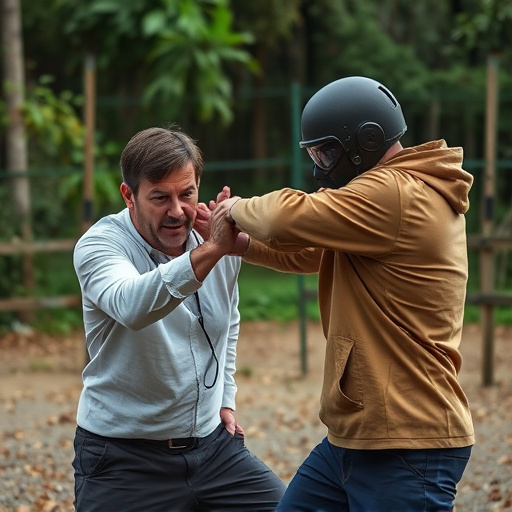
In some states, regulations around civilian ownership of stun guns, often referred to as shock batons, are stringent. These laws reflect a delicate balance between ensuring public safety and recognizing the potential benefits of self-defense tools for responsible citizens. The comparison between a stun gun and a shock baton is pertinent here, as both serve similar functions but differ in design and legal status.
States with strict stun gun laws often restrict or prohibit private individuals from owning these devices without proper licensing or training. Unlike shock batons, which are generally more widely available, stun guns may be subject to additional requirements such as registration, background checks, and even waiting periods. These restrictions aim to prevent misuse by ensuring that only those who have undergone the necessary preparation can access potentially lethal force tools, emphasizing the responsibility that comes with ownership.
A Citizen's Guide to Legal Defense and Safety Precautions
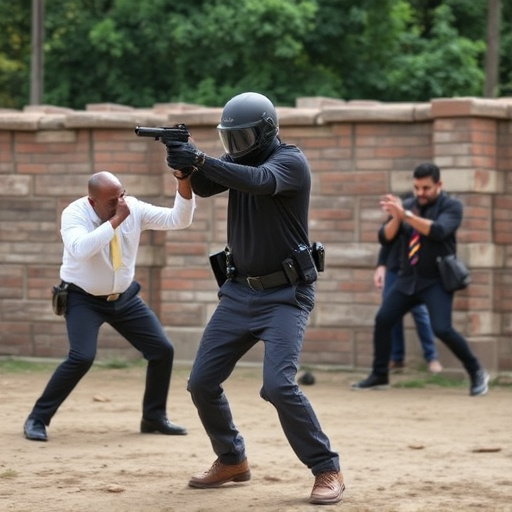
In many states, civilians can legally own stun guns or shock batons for self-defense purposes, but the rules and regulations vary significantly from place to place. Before purchasing a stun device, it’s crucial to understand your state’s specific laws regarding civilian ownership. A stun gun, often referred to as an electroshock weapon, delivers a powerful electric current that can temporarily incapacitate a target, providing a critical window for self-defense or escape. In contrast, a shock baton typically uses metal pins or blades that conduct electricity, allowing for both striking and shocking capabilities.
Safety precautions should always be prioritized when handling any type of stun device. Users must receive proper training on their device’s safe operation and deactivation, as misusage can lead to severe injuries. Additionally, keeping detailed records of all uses and ensuring regular maintenance are essential safety measures. Remember that while these devices offer enhanced personal security, they should only be employed as a last resort when facing an imminent threat. Consulting with legal professionals who specialize in self-defense laws is advisable to ensure you remain within the confines of the law.
When considering civilian taser ownership, understanding state laws and eligibility criteria is essential. This article has provided a comprehensive guide through the legal landscape, from state-by-state rules to safety precautions. The comparison between stun guns and shock batons highlights unique features that influence their legality and effectiveness. Remember that navigating these regulations is crucial for responsible ownership, ensuring you stay within the law while enhancing personal safety.

